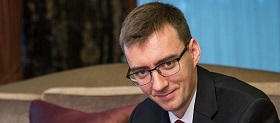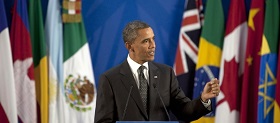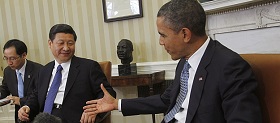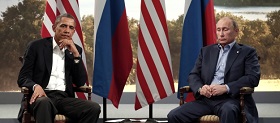In an exclusive interview with Russia Direct, Ivan Timofeev, program director at Russian International Affairs Council (RIAC) and associate professor at Moscow Institute of International Relations (MGIMO), presents a geopolitical forecast for the world in 2033.
Timofeev discusses how the world order is already changing and analyzes what a country needs to become a superpower. As Timofeev suggests, a multipolar world can be either a challenge or an opportunity for the U.S. and Russia, requiring them to adjust in new ways to the emerging geopolitical reality.
Russia Direct: What defines a superpower today?
First, we must get the terminology straight. Let us distinguish between the concept of a superpower and that of a great power. There is one key difference. A superpower can project its influence globally in a wide range of fields at one time, i.e., in economics, politics, ideology, culture, etc. A great power has either regional ambitions in these areas or projects its influence globally in a narrow range of fields.
Now, for the definition of a superpower, I would first mention the economy. It is hard to imagine a superpower without a diversified and advanced economy. As a rule, such countries are technological leaders: They are the first to invent new things, the first to offer them on the market and the first to derive super-profits.
If a country is capable of building such an economy, offer or impose its economic model on the world, it has a chance of becoming a superpower.
The second factor is the capacity to project power to back up its global ambitions by force. There is no need to use force all the time. Its very availability and the possibility of using it are, in themselves, a major resource. In the latter half of the 20th century, such potential included, for example, a major arsenal of nuclear weapons combined with a matching arsenal of the latest-generation conventional weapons. This combined potential has hardly ever been used but they made the U.S.S.R. and the U.S. superpowers. In the 21st century, it will most probably mean the ability to neutralize a nuclear strike and to deliver a quick non-nuclear strike with high-precision and robotic means.
The third criterion is the quality and size of the population, the country’s human capital. Education, mobility, the ability to leverage and use the creative potential of the people combined with such demographic parameters as birth rate, mortality rate and fertility. I would describe it as “organized passionarity.”
The fourth factor is soft power , i.e., the ability of a power to be globally attractive, to project images that determine the contours of world culture at a given moment.
A country becomes a superpower when it excels according to all four criteria. Failure with respect to just one criterion may well lead to decline and loss of superpower status.
Can the U.S. still be called a superpower?
Yes, of course, the U.S. is still a superpower. If you take the four criteria above, it is the leader on all four counts – economics, force, human potential and soft power. And it is still way ahead of other countries in all these respects.
It is another matter that the U.S. seems to have reached a peak in building up these parameters. America’s future as a great power raises major questions. The problem is not solely or largely the other countries that are trying to “catch up with” and “overtake” America. The problem lies in the changing world, to which it is necessary to adapt. The U.S. is not very good at this.
Look at Afghanistan. A superpower with all its potential is unable to turn Afghanistan into what it considers to be a “normal country.” Look at the global and regional processes in general. Today, one has to be very naïve to say that the U.S. controls them. The degree of control is obviously diminishing.
The internal problems in the U.S. are also cause for concern. The long-term trends threaten economic supremacy and human capital.
Let us go back to the issue of “catching up and overtaking.” Will other big powers, such as Russia or China, be able to catch up with the U.S. and form a “geopolitical triangle”? Of course, these are slightly outdated categories. But the existence of such players is a fact, so one can talk about a “game” between them.
Catching up with the U.S. or becoming a player comparable to it is an exceedingly difficult task. It is hard even for China, which is today demonstrating an impressive economic growth rate.
Even if China catches up with the U.S. in the near future in terms of GDP and some other indicators that would not mean that it would attain a stature comparable to that of the U.S.
There is a whole range of qualitative characteristics on which China has a long way to go. This applies to all the four parameters I have mentioned. Yes, it has a big economy, but it has yet to become a developed economy. Yes, its military might is growing. But the army has yet to become more mobile and more modern. Yes, it has a huge population, but there are the problems of aging and of “digesting” the rural population. Yes, it has an ancient culture and language, a global diaspora, but it has problems with being globally attractive.
China is a strong regional power that can possibly become a serious problem for the U.S. in the Asia-Pacific Region. Yet it is too soon to speak about global competition with the U.S., i.e., about superpower rivalry.
For Russia to reach parity with the U.S. is still more of a challenge. We have suffered immense losses over the last twenty years. The economy has become much more primitive. The excessive military potential has nearly destroyed itself. Today, our army faces the problem of the need for serious modernization, which is impossible without modernization of society as a whole. The human capital has been depleted as never before. The mortality rate is appalling. Education and culture have rolled back. Our image abroad is highly controversial.
This does not mean, of course, that we should sit on our hands. In spite of everything, I remain an optimist. Yet, I doubt we should think in terms of any kind of race. We need breathing space. We have to sort out our internal problems and overcome our moral crisis. We must offer the world attractive development models and solutions.
As regards the U.S., let me repeat that the threat comes not only or largely from rivals. The challenge for the U.S. is to adapt itself to the new realities and get on top of the new trends.
Some experts and historians thought that new economic blocs would emerge - one thinks of Harvard historian Niall Ferguson who advocated the idea of G2, an economic bloc of China and the U.S. What, in your opinion, will determine the world order in the next 20 years: How likely is the G2 or G3 scenario?
The emergence of a G2 or GX is unlikely. Let us not forget that, in addition to the U.S. and China, there are also the EU, India, Japan, Brazil and so on. Even so, attempts will be made to control global processes.
The problem is that, along with attempts at effective global control, the world will become ever more multipolar. Multipolarity increases uncertainty and risks compared with the bipolar or unipolar model. Yes, such a system of international relations is more pluralistic but it is also more chaotic and more difficult to manage.
These two trends, the trend towards greater multipolarity and the attempt to control global processes, will conflict with each other. We shall see which will prevail. My view is that attempts to build global institutions on the principles of equality will be extremely painful. In the medium term, the trend of multipolar competition might prevail.
How will the big powers adapt themselves to a multipolar world?
Multipolarity is a serious challenge. It is often perceived as a boon because it is associated with pluralism and democracy. This is true up to a point. But a multipolar world is fraught with many threats to stability of the system of international relations. Multipolarity will take a lot of getting used to.
At this point, it is important to look at the new world realities and depart for a while from the language of “geopolitics.” Look! In addition to the big powers we have today, a whole number of states are emerging that are managing to be quite influential players without claiming to be great powers.
For example, Russia and South Korea cannot be compared in terms of size. Yet South Korea is a major regional power in North-Eastern Asia, one that everybody has to reckon with. It produces a lot of high tech goods. It has built up its human capital. It is an increasing military force in the region, in spite of the leading role of the U.S.
Qatar is another example. Today it is hardly possible to ignore Qatar in the world information space. The country has managed to overtake many much bigger players in that segment.
This is a comparatively new phenomenon in international relations. Small states can quickly become, if not great powers of the19th-20thcentury kind, influential forces in their regions. They may become global leaders in narrow spheres and segments.
The phenomenon of the European Union should also be mentioned. It is an entirely new kind of player, relying on soft and not hard power in global affairs.
OK. We have a new world order, or the outlines of such an order. Which country will find it easiest to adapt itself to the new order – Russia, the U.S. or China?
Each country will have to adapt in its own way. America will have to learn to play the coalition game rather than going it alone. Barack Obama is trying to do this and having some success.
Russia should clearly determine its own niches, priorities and advantages in a multipolar world. To learn to use its “undervalued” assets. And believe me, it has many.
China needs the wisdom not to be dragged into a race for the sake of the race. That could prove fatal, for all the country’s apparent might.
How do you see the world in 2033?
The problem with most forecasts is that they see the world roughly as it is today, only more advanced, i.e., more globalization, more trade, more Internet, etc.
Most of these forecasts do not come true. There is always a “black swan” that will erase all the efforts of the prognosticators. And we have a lot of “white swans” that might drastically change the world. Economic imbalances, political contradictions, migration… All these are serious risks that could easily get out of control. And then we will suddenly see a totally new world.
Just for the sake of comparison: in 1989 and 1990, few people expected the Soviet Union to collapse, nobody believed it was possible, but in 1991 the Soviet Union was no more. Within two years, we found ourselves in a fundamentally new world nobody had anticipated.
We may see something similar in the next 20 years.
How effective will be the concept of global government in maintaining stability in the world? What role will the UN play in shaping the future world order?
Of course, attempts will be made to govern the global processes, new institutions will be created and, most probably, a further reform of the UN will be carried out.
But I would stress that, given the current trend towards multipolarity, it would be very difficult to build a system of global management.
How will such regional organizations as the SCO and CSTO fit into the new world order? What are their chances not to be lost in the midst of global diversity?
These structures will address regional issues, which is basically a good thing. It is easier to build an effective regional system than a global one. This is true of both security and the economy. Today, the world is teetering and it is better not to experiment with new global projects, but to attend to problems closer to home.
Ivan Timofeev is program director at the Russian International Affairs Council (RIAC) and Associate Professor at the Political Theory Chair at the Moscow Institute of International Relations. He has authored and co-authored more than 50 works published in and outside Russia. As a scholar, he is known for his work on the typology of modern states (“A Political Atlas of the Modern Times”), modelling of military spending and event analysis of local conflicts.
Source: Russia Direct







